Coffee Competition knowledge WBC Barista Competition judges' Handbook
Part I Technical scoring criteria
The scoring manual is an outline for judges to participate in the BARISTA competition. All judges of BARISTA competitions should be familiar with this standard. In addition to hands-on training, everyone has to undergo a written test in order to become a qualified judge of the BARISTA contest. The certification of the BARISTA contest is only valid for a few years.
Seven judges will evaluate each contestant. One general judgment, two technical judgments, and four sensory judgments. The score given by the chief judge is not included in the total score of the contestants. The score of the two technical judgments is given to find the average plus the score of each sensory evaluation. The final score of the contestant will include the total score of the four sensory judges.
The score range of technical evaluation is the same as that of taste evaluation.

You can give me half a point. The lowest valid score is 1, half of which is valid from 1.5, and the highest score containing half of a score is 5.5. The standard of the BARISTA contest is that baristas cannot change anything on the machine, such as filter handles.
Part I Technical Evaluation Handbook
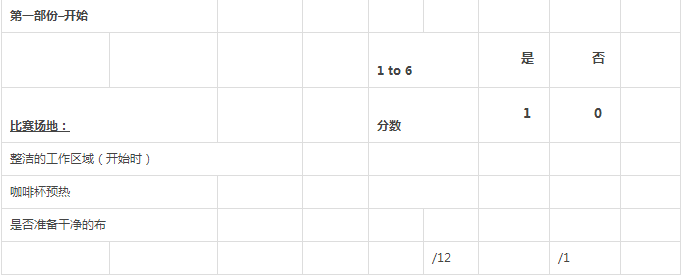
A neat work area at the beginning
A small amount of coffee powder is acceptable around the bean grinder. Barista has to work, so there are some coffee powders around the bean grinder that don't deduct points. The score ranges from one to six. If the work area is very chaotic, give zero. Sometimes it is difficult to distinguish between 4 points and 5 points, but you can give extra points if the overall impression is really good.
Other aspects that should be considered
1. Barista organizes work areas in a practical and effective way. If this is the case, points will be added. If all the above are in the right place, you can give a score of 3-5.
two。 Too much preparation has been made. If the milk is in the milk pot, the material has been added to the blender and water has been prepared in the cup, all beverage preparations should be carried out during the performance. If barista had done this, he would have scored only 1-2 points in this section.
Coffee cup preheating
The cup should be hot. Heat is a relative condition; so the range of scores is 1-6. Barista should preheat the cup on top of the concentrator during the preparation time. If the cup is hot, give it 3-5 points.
The following are not accepted during the performance:
1. At first, the cup was placed on the table.
two。 At first, the cup was placed in a basin with water.
If so, it will affect the score of the "work area that was cleaned at the beginning". We do not judge the method of barista preheating cup, but it should take place within 15 minutes of preparation. When the show starts, the coffee cup should be placed on the machine, it should be hot and there should be no water.
If the cup is cold, give it 0.
Do you prepare a clean cloth?
At the beginning of the show, there are at least three clean rags. Barista should have a separate dishcloth during the preparation time. If so, a point should be given.
Operation technology of ESPRESSO
Be careful
The filter handle and gasket should be checked to make sure it has not been changed
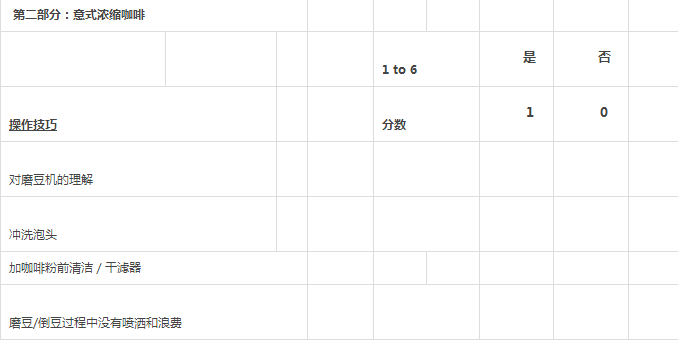
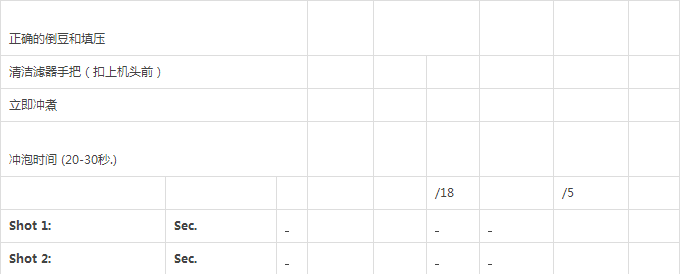
Understanding of bean grinder
Barista needs to prove that he knows how to use the bean grinder. When preparing time, barista should boil the espresso to test the quality to see if it is necessary to adjust the bean grinder for better brewing. For example, barista calls back the horizontal stem of the component, which is another example to prove that barista has a poor understanding of the bean grinder, because it will damage the spring of the component. The judge should also pay attention to the steps of barista filling the coffee powder into the filter, sweeping away the excess powder horizontally and pressing. The judge needs to have a high understanding of the bean grinder and related steps, such as dosing, Tamping and extraction. In the final, barista rarely got a full score of 6.
Rinse bubble head
Barista should start the concentrator's boiling button to flush the head before buckling the filter handle, and it is acceptable to flush the head before pouring powder into the filter. But the head of the machine must be washed before each cooking.
Clean / dry filter before adding coffee powder
The filter should be dry and clean-the way to do this is not important. As long as the filter is dry and clean.
There is no spraying and waste in the process of grinding / pouring beans.
What is spraying and waste? According to the standards of the barista competition, barista should be given the ability to work. A small amount of waste is acceptable. As long as there is not a lot of spraying and waste, it is up to standard. So what kind of situation will be unacceptable? If 10g of coffee- is wasted each time the powder filter is loaded, it will add up to 100g, which is unacceptable. The judge should also pay attention to the use of the bean grinder by barista. Barista should not fill the bean grinder with ground coffee powder. Using the filter handle to sweep the excess powder into the knockbox will be deducted points (waste), sweep the excess powder back to the bean grinder's doser is acceptable. In the final, barista rarely got a full score of 6.
Correct weight and packing pressure
Use enough powder to flatten the powder vertically with a filler. The judge should pay attention to the unflattened powder in the filter and determine whether the barista uses the correct amount of coffee, which also helps to evaluate whether it was sprayed during the grinding / pouring process. The barista should distribute the powder in the filter evenly before pressing the powder vertically with a filler.
Clean the filter handle before buckling the nose
Barista should clean the powder on the edge of the filter before buckling the filter handle to the head.
Make it immediately
The cooking button should be activated immediately after buckling the nose of the machine.
The brewing time is 20 to 30 seconds.
The recommended brewing time is 20 to 30 seconds. The taste of coffee is the most important, and you can judge whether it is brewed correctly from the quality of coffee.
Barista can present the espresso brewed in 18 seconds to tell the judge that his / her espresso mixture tastes best when brewing in 18 seconds. At the same time, the judges also agree that the quality of espresso is acceptable. Otherwise, give me 0.
Operation skill of Cappuccino-Milk foam
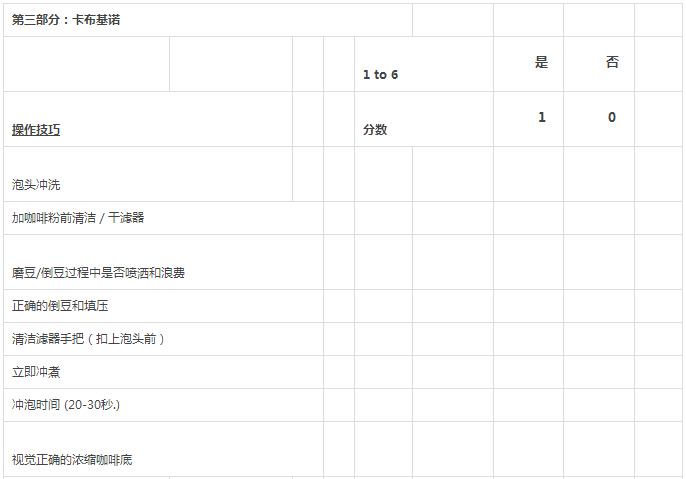
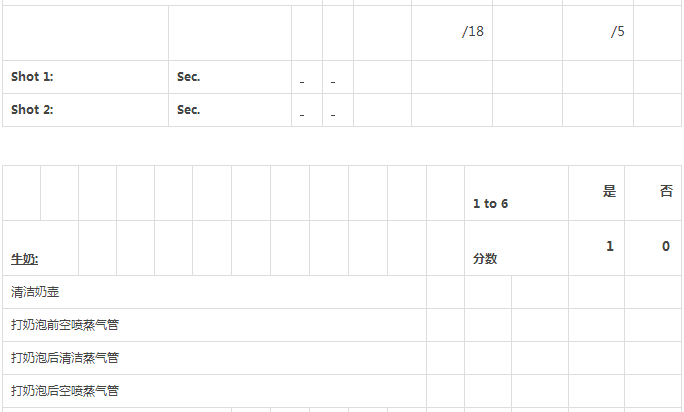

Note: the first seven reviews have the same operational skills as espresso.
Visually correct ESPRESSO background
Before pouring milk, the judge should evaluate the bottom of ESPRESSO. As in the application of ESPRESSO, the evaluation standard is based on the color, thickness and durability of crema.
A clean milk pot
Barista should pour frozen milk into a clean milk pot and should not pour fresh milk into the milk pot at the time of preparation.
Empty steam pipe before milking
Please note that the time for the barista empty steam injection pipe should be sufficient until only steam is ejected.
Clean the steam pipe after milking
Use towels that are only used to clean steam pipes. And should make sure it is clean.
Empty steam pipe after milking
You should explain yourself.
Emptying and cleaning of milk pot
After serving the coffee, the milk pot should be roughly overhead. If there is a quantity of 1CM, it should be given a score of 3-4. If it is completely empty, it should be given a score of 5-6.
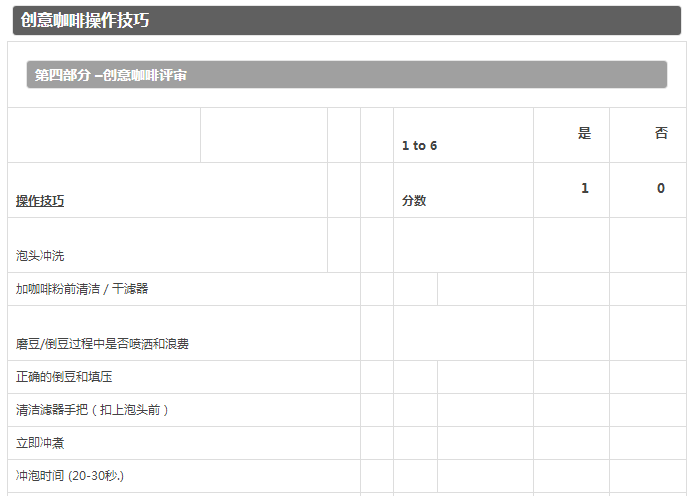

Be careful
The judgment is the same as that of Cappuccino's operating skills.
The score at the end of the technical competition
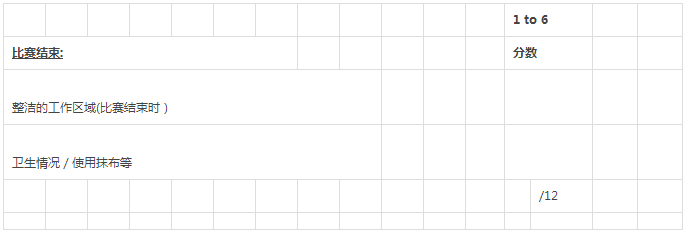
The work area at the end of the game
A small amount of coffee powder is acceptable around the bean grinder. Barista has to work, so there are some coffee powder around the bean grinder without deducting points. The score ranges from one to six. If the work area is very chaotic, give zero. Sometimes it is difficult to distinguish between 4 points and 5 points, but you can give extra points if the overall impression is really good. If there is an accident, such as pouring coffee, the barista should clean it.
Hygiene / use of rags
Throughout the competition, the judges rated the hygiene conditions. The score ranges from 1 to 6. The judges will score according to the overall performance. At the beginning of the show, there are at least three clean rags-all for separate purposes. The judge should rate the use of these rags. Baristas should use one for the steam pipe, the second for the filter and the last for the console.
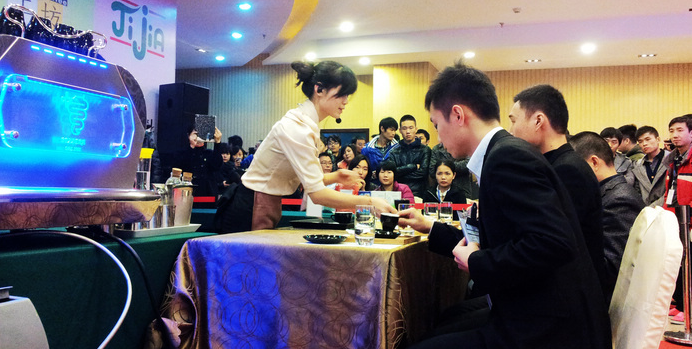
Important Notice :
前街咖啡 FrontStreet Coffee has moved to new addredd:
FrontStreet Coffee Address: 315,Donghua East Road,GuangZhou
Tel:020 38364473
- Prev
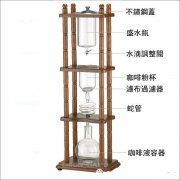
Introduction to the use of ice drop coffee pot with knowledge of fine coffee
Ice drop coffee, also known as water drop coffee, ice brewed coffee, is a way to make coffee drinks. Ice drop coffee uses ice water, cold water or ice cubes to extract coffee, which is very slow and often takes hours, so ice drop coffee is more expensive. Ice droplets were invented in the Netherlands, and the common iced coffee drip filter consists of 3-4 layers of glass containers mounted on wooden seats. System
- Next

Common sense of espresso Crema analysis of oil in Italian coffee machine
Crema (grease) I don't understand why we make Crema so much more complicated than itself. Crema is often seriously misdescribed, the most common of which is an emulsified oil. Well, I think it's fair to say that to a very small extent. As far as we know, the amount of oil obtained by Espresso in the extraction process is unique. In the process of Espresso extraction, the content of steam
Related
- Beginners will see the "Coffee pull flower" guide!
- What is the difference between ice blog purified milk and ordinary milk coffee?
- Why is the Philippines the largest producer of crops in Liberia?
- For coffee extraction, should the fine powder be retained?
- How does extracted espresso fill pressed powder? How much strength does it take to press the powder?
- How to make jasmine cold extract coffee? Is the jasmine + latte good?
- Will this little toy really make the coffee taste better? How does Lily Drip affect coffee extraction?
- Will the action of slapping the filter cup also affect coffee extraction?
- What's the difference between powder-to-water ratio and powder-to-liquid ratio?
- What is the Ethiopian local species? What does it have to do with Heirloom native species?

